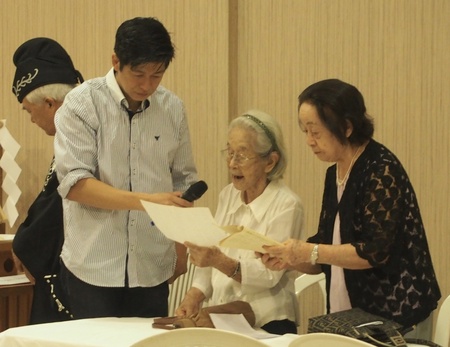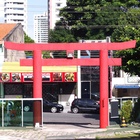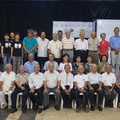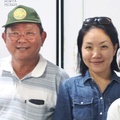My mission as a JICA volunteer has come to an end. For several months before returning home, I visited various schools as if I was in a rush to finish my activities. After returning home, I was busy with various procedures and job hunting, and now, after three months, I have finally regained my composure. It has been a long time since my last contribution, but there was something I had always wanted to write about during my term. This column, titled "Japanese Society in the Amazon," is something that I must not forget when talking about it. Fortunately, I was allowed to continue writing after my term ended, so I would like to talk about that theme this time.
"Yasui-san, what do you think of 'Space'? I think your husband would be very happy with it."
"Oh! That's great! I'll take that!"
It was very heartwarming to see her smiling face as she wrote on the calligraphy paper. Nobuko Yasui (83 years old), the wife of Takataku's fourth-year student Uchu Yasui, was a student at the calligraphy class where I was a lecturer. When deciding what characters to use for the work to be exhibited at the school festival, she adopted my idea. She doesn't usually talk much about her husband, but from the way she acted at this time, I could see how much she loves him.
"Takataku students" is a word I heard many times during my term. "Takataku" refers to the Kokushikan Higher Colonization School (later renamed the Japan Higher Colonization School), and students who studied in Japan for a year with the aim of developing the Amazon were called "Takataku students". The school was founded in 1930 by Uetsuka Tsukasa, who was a member of the House of Representatives at the time. He was the nephew of Uetsuka Shuhei, an agent of the Imperial Colonization Company, who traveled to Brazil with the first group of immigrants on the Kasato Maru in 1908. Uetsuka Shuhei is said to be the right-hand man of Mizuno Ryu, the "father of Brazilian immigration", who paved the way for Japanese people to settle in Brazil.
The first group of 47 graduates, who had studied under Uetsuka Tsukasa's guidance to become leaders in the development of the Amazon, arrived in Vila Amazonia, near Parintins, Amazonas, in June 1931. Their main activity was jute cultivation. At the time, Brazil held 80-90% of the world's coffee market share, but was 100% dependent on imports from India for jute, the raw material for the burlap bags used to export the beans. From the following year onwards, graduates were sent every year, and by 1937, 248 people had settled there, and activities were progressing smoothly. Taka Taku's jute cultivation brought great results in the Brazilian Amazon.
Although many of the children were from middle-class or higher families and were highly talented, some could not bear the hardships of life in the Amazon, where insects swarmed and people lived in places covered with plant leaves, and some returned to their home country or moved to São Paulo. However, many continued to live in the Amazon once they arrived. Some even got married, started families, and achieved further success.
Last year, a ceremony was held in Belém, Pará, to commemorate the 85th anniversary of the Takataku settlement. About 50 people, including Chairman Ono Shigeyoshi of the Para Takataku Association, participated and paid tribute to the deceased at the altar. There are no survivors at present, but those who know a lot about the Takataku, such as Atsuko Kobayashi (98 years old), wife of the second-year student Masumi Kobayashi, and the aforementioned Nobuko Yasui, are valuable in passing on the history. I was also able to see up close that they are still proud to be family members of Takataku students.

The presence of several grandchildren at the same table also seemed to be an indication of the feelings of the surviving family members who want to pass on Takataku's thoughts to future generations. One of them, Yuji Yamazaki (27 years old), the grandson of 4th year student Taro Yamazaki and principal of Belem Japanese Language School, spoke passionately, "I don't understand Japanese, but I am proud that I have a Japanese soul inside me. I am a little confused about being the principal this time, but this is a bond that my grandfather connected me to. I will do my best." When we meet, he always talks about the school and is a serious person who works hard. The young man who went to the Amazon with dreams and hopes in his heart, and was full of energy to clear the wilderness covered in sweat, must be happy to see his grandson growing up. I sincerely hope that their thoughts will be passed down for generations.
© 2017 Asako Sakamoto






